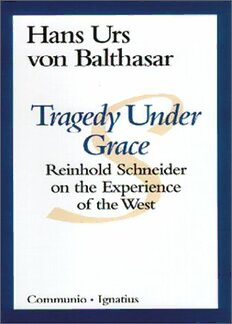
Tragedy Under Grace: Reinhold Schneider on the Experience of the West PDF
Preview Tragedy Under Grace: Reinhold Schneider on the Experience of the West
TRAGEDY UNDER GRACE HANS URS VON BALTHASAR TRAGEDY UNDER GRACE Reinhold Schneider on the Experience of the West TRANSLATED BY BRIAN MCNEIL, C.R.V. A COMMUNIO BOOK IGNATIUS PRESS SAN FRANCISCO Title of the German original: Nochmah: Reinhold Schneider © 1991 Johannes Verlag, Einsiedeln, Freiburg The author prepared this revised and expanded edition of Reinhold Schneider: Sein Weg und sein Werk before his death in 1988 Cover by Roxanne Mei Lum © 1997 Ignatius Press, San Francisco All rights reserved ISBN 978-0-89870-555-3 Library of Congress catalogue number 96-78008 Printed in the United States of America Written for and dedicated to the Secular Institutes CONTENTS Preface to the New Edition Introduction ORIGINS PORTUGAL-THE DREAM The Coast The Idea The Image SPAIN-THE FORM The King The Castle Faith PRUSSIA-POWER The Misery The Deed The Rift HISTORY ENGLAND-THE GUILT The Island The Parting of the Ways Right RUSSIA-CONFESSION The Good Thief The Left Cheek The Thief on the Left GERMANY-PENANCE Turning Around Insight The Work THE CHURCH ROUEN-THE GLORY The Commission The Encounter The Only One ROME-THE MINISTRY The Office The Renunciation The Kingdom MARIENBURG-KNIGHTHOOD The Fortress The Spirit The Cross Curtain The Departure Nada Bequest Bibliography PREFACE TO THE NEW EDITION The first edition of this book was placed in the hands of Reinhold Schneider when he turned fifty in 1953, with the request not to read it if my presentation confused him and dammed up the flow of his inspiration. The preface emphasized how much his mighty work is the fruit of prayer and renunciation and the giving of testimony, in such a way that the person, harassed through and through and exhausted by intellectual and physical pain, unshaken either by boycott and slander or by the many honors paid him, wished to recede totally behind his task, and succeeded in doing so. What most fascinated me in this work was the omnipresent drama of the encounter between two missions that are equally original and yet stand in a deadly mutual conflict: the mission of the one who is entrusted with the task of administering the earthly realm and the mission of the saint as the real symbol of the kingdom of God that descends into the world. The inescapable quality of this encounter appeared to me as a guiding image, an image to be retained at all costs, for the secular institutes that had recently been permitted to exist in the Church: their fundamental aim is to combine the radicalism of the gospel with a total, active involvement in secular work, enduring in their own selves the conflict described here. At that time, it was not yet possible to recognize how deeply and variously Reinhold Schneider had thought through this problem, returning to deal with it again and again and averting one-sided solutions; one may well say that only the publication of his diaries from 1930 to 1935 (almost a thousand pages) has shed sufficient light on his ever new struggle with what he saw as the decisive and tragic conflict between life in the world and transcendence—and this in the years before his return to the Catholic faith. And what position does the writer take on this fundamental problem of Christian existence? “Faith addresses the indivisible man. This is why it is so senseless to make a distinction between the statesman as politician and the statesman as Christian, between the Christian as soldier and as the one who kneels at the communion rails. So if faith is present, it flows into the literary composition.” And yet there is active here “Kierkegaard’s doubt, which I cannot rob of its force: Is it genuinely possible to busy oneself with
